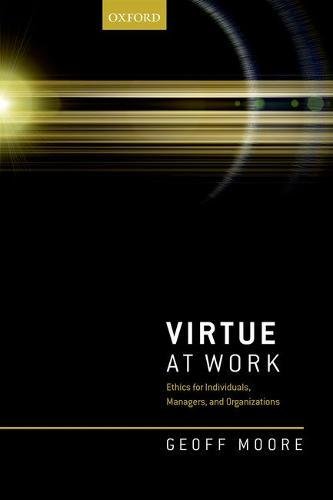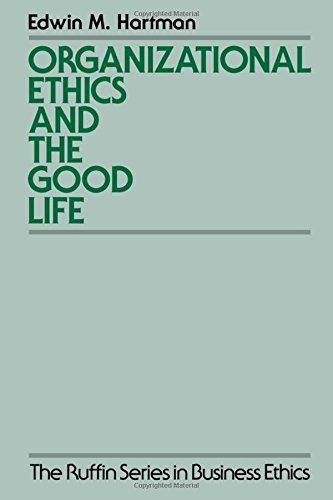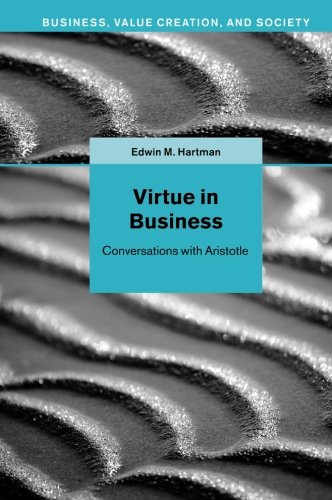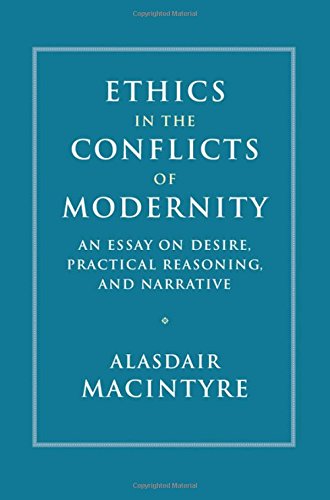
1

2

3

4

5
Since MacIntyre’s After Virtue and Anscombe’s “Modern Moral Philosophy,” neo-Aristotelian virtue ethics has become prominent within moral philosophy. It has also made a large impact within business ethics. Unlike older perspectives drawing upon variants of deontology and utilitarianism, neo-Aristotelian approaches in business ethics seeks to identify the intrinsic ethical basis of collaboration inherent within production processes in organizations. At first glance, Macntyre’s influence in business ethics may seem odd, but this follows directly from the claims of After Virtue. There MacIntyre had argued that ethics could only be understood in terms of the functioning of a community where individuals achieved their own good by contributing to the common good of the community. Research in business ethics has sought to identify the extent to which this condition is met in a contemporary organizational context.
1
While many readers focused on MacIntyre's critique of the "Enlightenment Project" and modern moral philosophy more generally, research in business ethics has focused on the discussion of practices and institutions (especially in Chapter 14). This has provided a means of analyzing organizations in terms of the relationship between competitive and cooperative activities directed, respectively, toward individual and shared goals; and the role of the virtues in facilitating cooperation and balancing short and long term goals.
2
Moore summarizes and extends the large body of empirical and theoretical research that has built upon MacIntyre's practice-institution schema in business ethics. He relates this framework to individual, managerial, and organizational levels and focuses on the role of the virtues in relation to each level of analysis.
3
Hartman was one of the earliest proponents of neo-Aristotelianism in business ethics research. This book provides something like a prolegomenon to virtues ethics approaches to business ethics. Hartman systematically deconstructs applied approaches to business ethics showing that business ethics can only have a determinate content insofar as the organization is understood as a type of community that both shapes members' preferences and is intrinsically shaped by normative notions.
4
In this book, Hartman extends his previous work and focuses more explicitly on Aristotle's practical philosophy as providing a means of understanding the firm as a type of community that contributes to human flourishing. He also discusses applications of MacIntyre's framework in business ethics.
5
In MacInytre's latest book, he brings together much of his earlier work, presenting a comprehensive account of neo-Aristotelian practical philosophy. While he discusses met-ethical and political issues, he also explicitly addresses organizational ethics, applying and extending his previous discussions of practices. MacIntyre's argues that firms are a key locus of common goods that contribute directly to human flourishing; and, because of this, they are a continuing site of conflict. While acknowledging the ambivalence of firms and organizations, MacIntyre clearly appreciates their fundamental place in any contemporary Aristotelian account of the virtues and the common good.

1
While many readers focused on MacIntyre's critique of the "Enlightenment Project" and modern moral philosophy more generally, research in business ethics has focused on the discussion of practices and institutions (especially in Chapter 14). This has provided a means of analyzing organizations in terms of the relationship between competitive and cooperative activities directed, respectively, toward individual and shared goals; and the role of the virtues in facilitating cooperation and balancing short and long term goals.

2
Moore summarizes and extends the large body of empirical and theoretical research that has built upon MacIntyre's practice-institution schema in business ethics. He relates this framework to individual, managerial, and organizational levels and focuses on the role of the virtues in relation to each level of analysis.

3
Hartman was one of the earliest proponents of neo-Aristotelianism in business ethics research. This book provides something like a prolegomenon to virtues ethics approaches to business ethics. Hartman systematically deconstructs applied approaches to business ethics showing that business ethics can only have a determinate content insofar as the organization is understood as a type of community that both shapes members' preferences and is intrinsically shaped by normative notions.

4
In this book, Hartman extends his previous work and focuses more explicitly on Aristotle's practical philosophy as providing a means of understanding the firm as a type of community that contributes to human flourishing. He also discusses applications of MacIntyre's framework in business ethics.

5
In MacInytre's latest book, he brings together much of his earlier work, presenting a comprehensive account of neo-Aristotelian practical philosophy. While he discusses met-ethical and political issues, he also explicitly addresses organizational ethics, applying and extending his previous discussions of practices. MacIntyre's argues that firms are a key locus of common goods that contribute directly to human flourishing; and, because of this, they are a continuing site of conflict. While acknowledging the ambivalence of firms and organizations, MacIntyre clearly appreciates their fundamental place in any contemporary Aristotelian account of the virtues and the common good.
© Five Books 2024